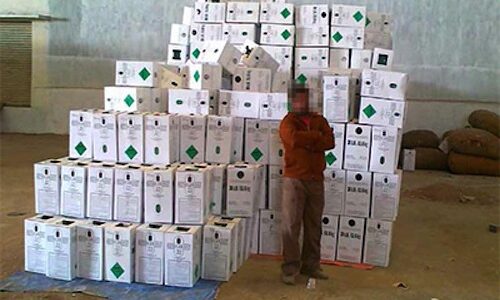Refrigerant robocop
- PostedPublished 10 December 2020
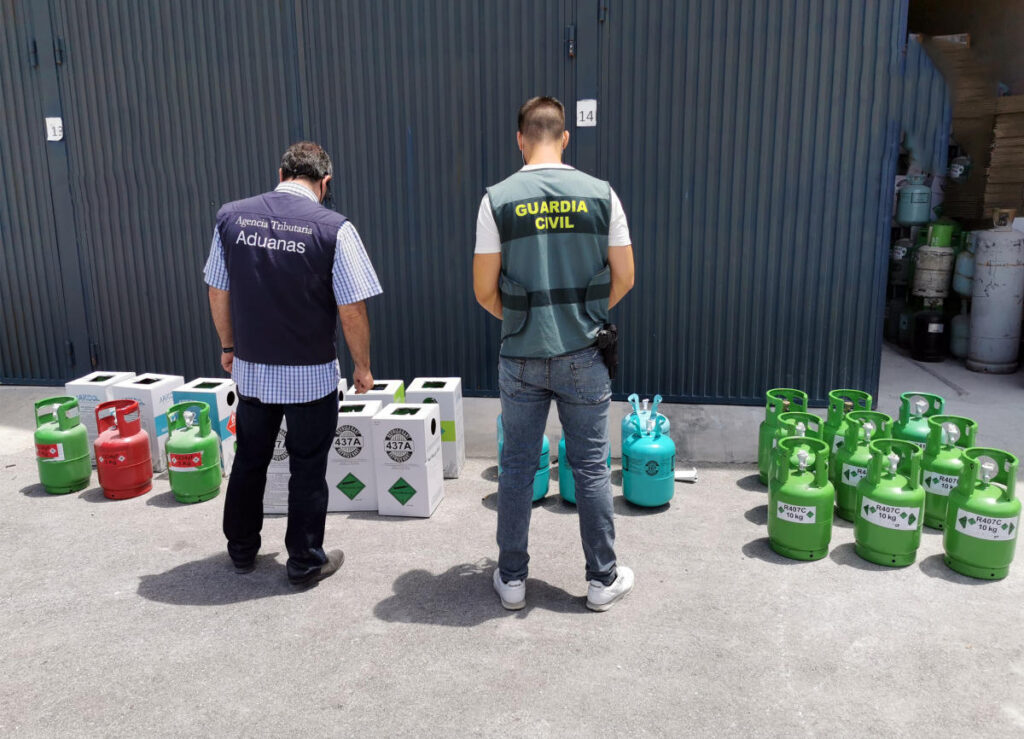
Technology will help stem illegal sales, reduce influx of illicit refrigerants
EFFORTS to counter the extensive illegal refrigerant trade in Europe are about to be bolstered by a new advanced software system from the United Kingdom.
The system, which will be developed by online trading specialist Vistalworks, will be designed to automatically find and identify online sellers of illegal fluorinated gases (F-gases).
It will then track volumes, outlets and other data to detect patterns that indicate organised illicit trade, the details of which can then be provided to enforcement agencies.
Aside from enabling authorities to track and find illegal sellers, the software – in conjunction with sampling and testing processes – will further support prosecutions.
Consequently, authorities will stand a better chance of locating, prosecuting and stopping individuals and organisations that are illegally trading F-gases.
This will potentially help curb what has become a major issue in Europe following the introduction of the European F-gas Regulation in 2015.
The legislation aims to phase down the use of high global warming potential (GWP) F-gases, including HFC refrigerants such as R134a.
However, the subsequent reductions in availability of many commonly used refrigerants have led to surges in demand and prices, causing a hike in illegal trade that threatens to defeat the objective of F-gas legislation and refrigerant quotas.
Exacerbating the issue is that many of the illegally imported refrigerants are of an unknown blend; in some cases, for example, supposedly non-flammable refrigerants have been found to be distinctly flammable.
Vicky Brock, chief executive and co-founder of Scotland-based Vistalworks, said: “Reducing the black market will enable legitimate businesses to ‘build back better’ from the COVID-19 pandemic, creating a more sustainable economy and directly tackling the illegal emissions threatening Net Zero targets in countries across the globe.”
Vistalworks, which specialises in protecting consumers from buying fraudulent or dangerous online goods, has received £60,000 ($A109,000) from the British government’s Innovate UK Sustainable Innovation Fund to develop the software.
More details are also expected to be revealed ahead of the 26th UN Climate Change Conference (COP26) in Glasgow next year.
Raising awareness
Furthering the fight against the illegal refrigerant is a new campaign from the European Fluorocarbons Technical Committee (EFCTC).
It has created a pledge under the hashtag #SayNoToIllegalHFCs, designed to encourage collaboration between individuals and companies to quell the black market trade of illegal refrigerants.
Those who pledge, which can be done online at stopillegalcooling.eu/pledge, will receive benefits such as bespoke social media tiles plus recognition and press attention from the EFCTC.
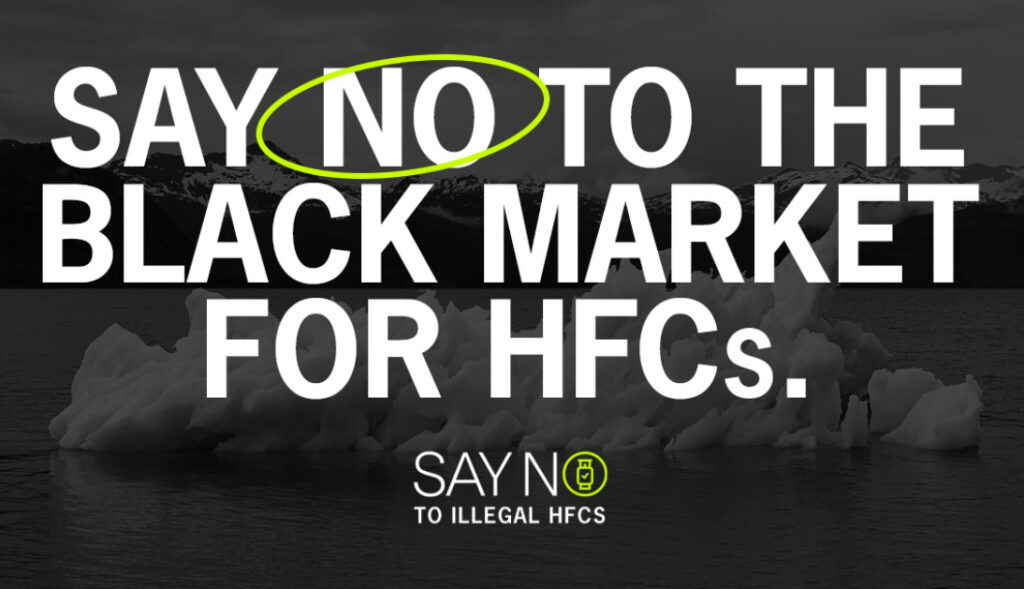
It might not sound significant but it will raise awareness of the issue and serve as the first step for someone in the HFC supply chain to begin aiding the fight against illegal activity.
Everyone is welcome to pledge, from producers to end users, and companies that have signed the pledge so far include Arkema, Chemours, Daikin, Honeywell, Koura and Westfalen. Organisations such as the Association of German Refrigeration and Air Conditioning Contractors (VDKF) have also signed up, further boosting awareness.
Back it up with enforcement
Conversation and collaboration is all well and good, but enforcement of the F-gas regulations still requires much work – and the EFCTC is continuing to call for improvements on that front.
“The EU and member states should meet ambitious legislation with ambitious enforcement at their borders,” said Felix Flohr, sales and marketing manager and regulatory specialist at EFCTC member company Daikin Chemical.
“Fines need to be higher, harmonised and consistent across all member states. Customs officers need to be equipped with the tools to identify illegally imported HFCs and access the HFC registry in real time,” said Flohr.
The EFCTC is among many that have been speaking out about the lack of penalties being levied against those dealing in illegal refrigerants.
Currently, the European Commission (EC) is considering updates to further limit HFC availability through the F-gas regulations – and countless companies, organisations and individuals, as part of their feedback to the EC’s proposals, have similarly cited disappointment at the lack of punishment and penalties being levied against illegal importers.
The European association of refrigeration, air conditioning and heat pump engineers (AREA), for example, stated that insufficient enforcement and illegal imports had led to unfair competition and a weakening of the phase-down mechanism.
British manufacturer A-Gas also highlighted that current regulations were being “undermined by the large and continued import of illegal HFCs”.
HFC phase-down, vigilance phase-up
The EFCTC has also asked for European member states to check all companies are in compliance with import regulations and operating legitimately.
This is in part because the legal market for HFCs is set to shrink in January 2021, as the quota will reduce from 2018-2020’s 63 per cent of the 2015 benchmark to 45 per cent, which could cause a rise in illegal trade.
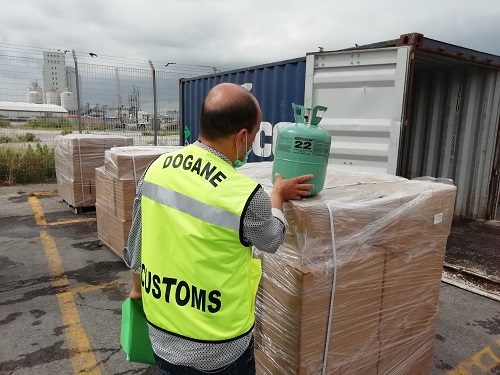
And, despite what some authorities have claimed previously, the scale of the matter is significant; in 2018, a reputed 34 million tonnes of CO2 equivalent was illegally imported – equivalent to a third of the legal HFC market in Europe
Success stories
On the plus side, agencies such as the European Anti-Fraud Office (OLAF) and other organisations are helping authorities to seize at least some of the continued illegal imports.
Italian customs, with support from OLAF, recently stopped a shipment of 3.7 tonnes of HFCs in illegal non-refillable cylinders.
According to the Italian Agency for Customs and Monopoly, the haul had a value of $A48,000 and a CO2 equivalent of 6800 tonnes had it been released to the atmosphere.
Dutch authorities also recently seized more than 10 tonnes of illegally imported R404A cylinders, according to Cooling Post, while Spanish authorities captured a warehouse containing 19 tonnes of illicit refrigerants and cylinder-filling equipment.
Worldwide collaborations are also having results. A global operation called DEMETER VI involving 73 customs agencies and focused on trans-boundary waste and HFC shipping, resulted in 99,000 tonnes of illegal shipments being seized – including more than 31 tonnes of HFCs.
Closer to home
Furthermore, companies acting unlawfully are copping some significant fines.
In Australia, authorities fined a fire protection company $500,000 for knowingly importing several one-tonne cylinders of fire-suppressing R227ea without the required permits.
Such hefty penalties, if doled out on a more regular basis, would no doubt make others think twice before engaging in the illegal import of refrigerant.
HFC import quota tweaked by pandemic
The Australian government has announced changes to the hydrofluorocarbon (HFC) quota allocation rules that are designed to alleviate issues stemming from the COVID-19 pandemic.
Currently, under HFC import rules, quota allocations for importers are calculated for a two-year period – but, to maintain the maximum quota allocation for the next period, a company is required to have used 100 per cent of its quota in the past two years.
However, as many are struggling with logistical challenges caused by COVID-19, the rules have been updated to increase their flexibility and account for delays. Consequently, as of September 2020, quota holders who import 75 per cent or more of their quota will have that figure count as 100 per cent towards their allocation for the 2022-2023 allocation period.
The change applies to the “grandfathered” quota, which is allocated to long-standing importers and accounts for 90-95 per cent of the annual HFC quota. Non-grandfathered quota remains available as well, for new applicants seeking to import HFCs.
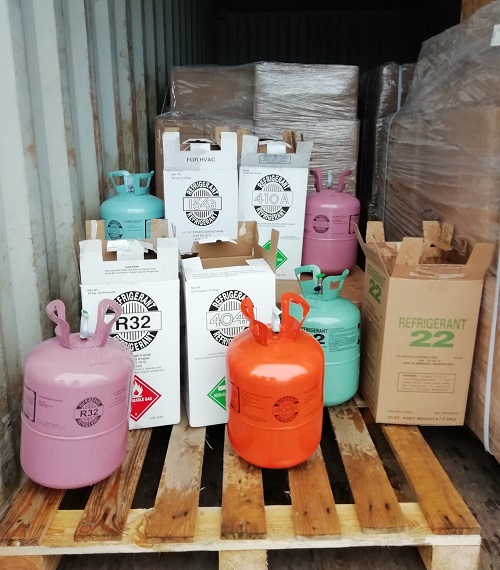
- CategoriesIn SightGlass
- TagsHFC phase down, HFC phasedown, HFCs, Illegal refrigerant, illegal refrigerants, refrigerant, refrigerants, SightGlass News Issue 22

